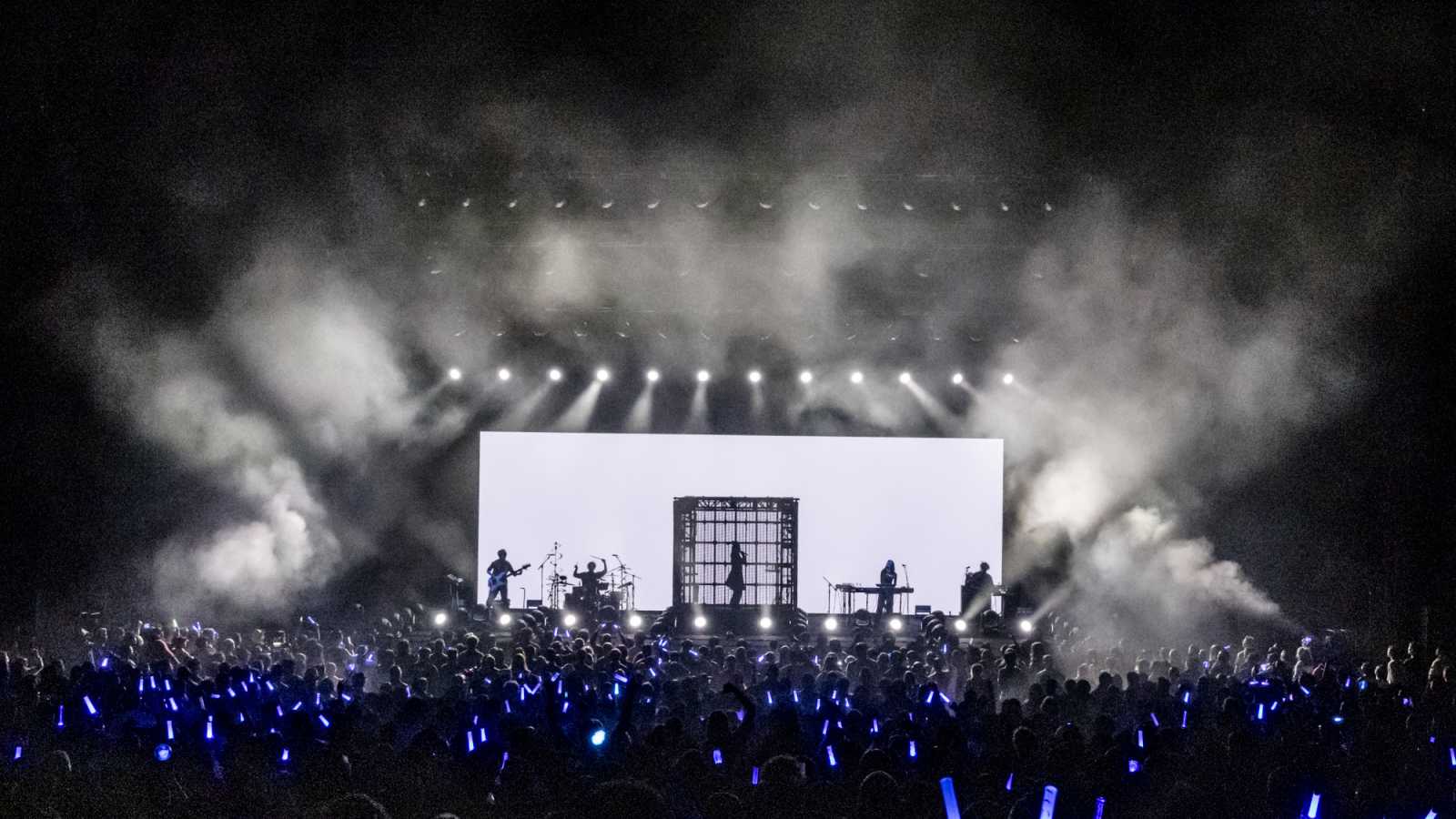ORANGE RANGE was formed in Okinawa in March 2001 following NAOTO's and KATCHAN's middle school graduation. YOH joined the band shortly after, followed by HIROKI. After they began to practice during after school hours, YOH invited his younger brother, RYO, to join the band. The final young hopeful to join the group was YAMOTO, who was discovered following a scouting mission initiated by the other members.
With their original line-up finally established, ORANGE RANGE began their career by performing at live houses around Okinawa. It should be noted that at this early stage in their history, the group was only performing covers of songs by established popular acts such as Mr.Children, GLAY and LUNA SEA. Finding themselves highly regarded at such an early stage, the group was recruited by indie label SPICE MUSIC (who also recruited HIGH and MIGHTY COLOR). ORANGE RANGE released their first album, Orange Ball, that same year, with the CD being issued as both a nationwide and Okinawa only release.
In order to promote themselves, the group extensively toured Okinawa and released their only indie single, Michishirube, in August. Having gained the confidence that they could achieve great things, ORANGE RANGE left Okinawa in order to establish themselves on mainland Japan. However, making themselves known as a band to be taken seriously was not an easy feat, but with busy tour schedules and performances alongside acts such as LOVE PSYCHEDELICO, Do As Infinity and MONGOL800, the group finally received recognition.
After being signed with Sony, June 2003 signaled the band's major debut with the single Kirikirimai, which, for a debut single, reached a notable number fifty on the Oricon charts. However, it was their second single, released only a month later, that truly garnered ORANGE RANGE the respect that they so desired. Shanghai Honey, despite no assistance through promotional means, hit the number five spot on the Oricon charts. Similarly, their following two successive singles of 2003 gained notable positions on the charts as well.
Following the relative popularity of the singles, ORANGE RANGE released their first full-length album, 1st CONTACT, in December 2003. The album, which missed out on the top spot due to the release of Hamasaki Ayumi's Memorial address, charted for ninety-two weeks and, thanks to sales of 589,229 copies in 2004, became the number fifteen best selling album of the year.
2004 saw the group taking the decision to rework one of their earlier singles, Michishirube, which finally gained the group their first number one hit. Admirably, all of ORANGE RANGE's subsequent single releases have achieved a place in the top three, establishing them as one of the most popular acts to work within the Japanese music industry.
With the following single, Locolotion, the group found themselves blamed for attempted plagiarism. The song, which was based on Carole King's The Loco-Motion found ORANGE RANGE hot under the collar. While King was not initially credited as being the composer of the song, her name was later added in the credits of the group's musiQ album of 2004.
In October 2004, ORANGE RANGE released their most popular single to date. Hana was used as the theme song for the movie Ima, ai ni yukimasu, as well as in a commercial. The single, which reached the number one position on the Oricon, charted for fifty weeks. The release proved to be extremely popular, gaining recognition on both the 2004 and 2005 yearly charts. 2004 saw the single selling a commendable 661,175 copies, making it the number four single of the year and in 2005.
With the release of their second album, ORANGE RANGE once again saw their attempts at gaining the number one position on the Oricon thwarted by the KinKi Kids, although in the second week of sales they managed to take the poll position. Due to sales of 2,630,763 copies in 2005, it became the number one selling album of the year.
Due to the peak in their popularity, ORANGE RANGE established their official fan club, RANGE AID, which allowed fans the opportunity to take sneak peaks at their latest music videos and a glimpse into their lives through their personal diaries.
The following year saw ORANGE RANGE releasing the single of a song that they had been performing for several years. *Asterisk was used as the opening theme for the anime BLEACH and, thanks to its high sales of 628,329 copies, it became the number four top selling single of 2005.
Along with continuing the trend of releasing promotional singles prior to an album, came the sudden announcement of KATCHAN's imminent departure from the group. On May 31, 2005, he left the band following the release of their eleventh single, citing "creative differences". This decision to leave the group could be based around ORANGE RANGE's main focus shifting away from rock elements to a more hip-hop based orientation. For those fans who favor KATCHAN, however, he announced the formation of a band called KCB in 2006.
Perhaps as an unspoken tribute to KATCHAN, ORANGE RANGE has remained without a drummer since and uses session percussionists to fill his role. With the release of their third album in October, the group once again found themselves at the number one spot on the Oricon and, with sales of 648,776 copies in 2005, the album achieved the eleventh position on the best selling album of the year chart.
2006 saw ORANGE RANGE's first single of the year, Champione, being used as the theme for the NHK broadcast of the 2006 FIFA World Cup. For the first time in their musical career, the group's following single was limited to 100,000 copies. Perhaps more interestingly however, the single's cover depicted a "daimyo" (referring to a powerful feudal lord or ruler) and also broke ORANGE RANGE's nine strong consecutive number one hits.
The same year also saw the release of the group's first remix album, which reached number seven on the Oricon and ORANGE RANGE also released their self-titled fourth studio album.
The following months saw a slow down in activities for the group, with their first single of 2007 being released in April and the following single being used as promotional material for the release of their two best-of albums a week later. Orange and Range hitting the first and second spots in their first week of sales, the group reaffirmed their popularity as one of the more diverse acts within Japan.
As of 2008, ORANGE RANGE has released their first single of the year in March. Kimi Station, which was used as the theme for the drama Loss:Time:Life, achieved the group a number two position on the charts.
With such strength and determination in their abilities, it is no wonder ORANGE RANGE has established themselves as one of the main popular acts in Japan and a force to be reckoned with.




